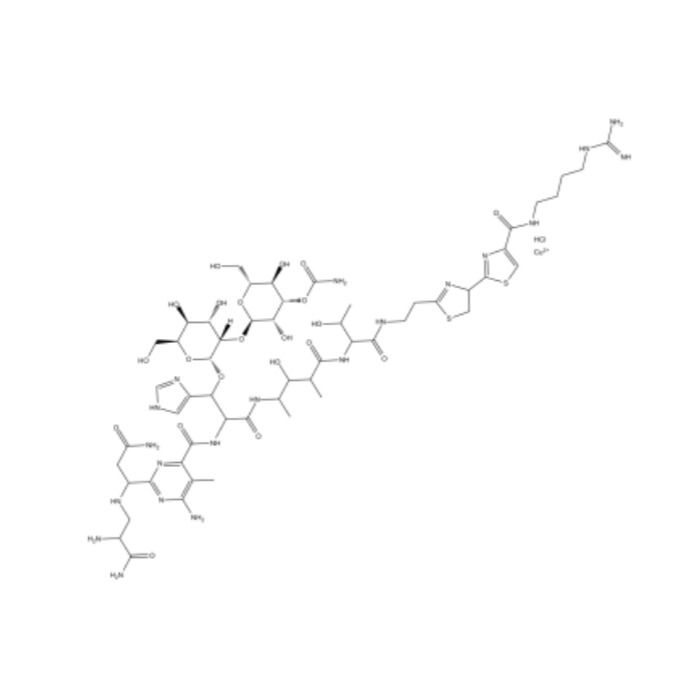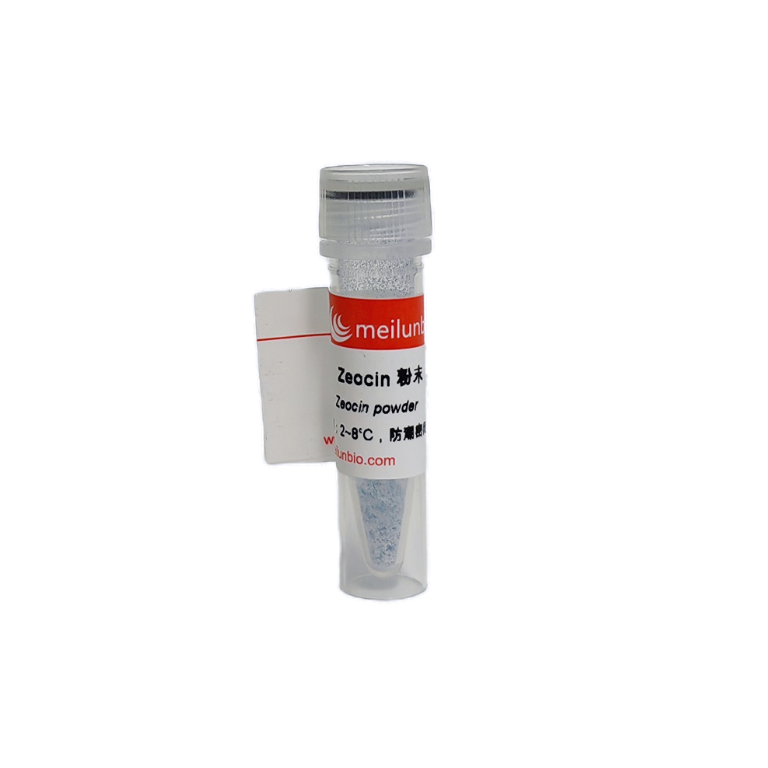分子式:C55H85O21N20S2Cu·HCl 分子量:1526.5
简介:Zeocin是腐草霉素D1(Phleomycin D1)的商业名称,是从轮枝链霉菌(Streptomyces CL990)分离得到的一种铜螯合的糖肽抗生素,属于博来霉素(bleomycin)家族,通过嵌入DNA使其断裂而导致细胞死亡。Zeocin可在大多数需氧细胞中发挥功效。Zeocin是常用的高效筛选抗生素,适合多种细胞类型筛选表达Sh ble基因的载体(细菌、真核微生物、植物细胞和动物细胞)。
别名:Zeocin powder;Phleomycin D1;腐草霉素D1
物理性质和指标:
外观:……………………蓝色固体
溶解性:…………………溶于水、HEPES缓冲液
用途及描述:科研试剂,广泛应用于分子生物学,药理学等科研方面,严禁用于人体。主要用于以下用途:
- 用于基因敲除和基因沉默研究。
- 用于细胞培养中的抗生素筛选。
- 用于研究DNA损伤和修复机制。
- 用于研究细菌耐药性。
储存条件:2-8℃,避光防潮密闭干燥
运输条件:湿冰运输(按季节)
生物活性:
Zeocin可选择Sh ble基因表达的细胞。与现在使用的其他动物细胞标记物无交叉抗性。因此这种抗生素可用来分离对其他筛选剂(如:庆大霉素,潮霉素)有抗性的克隆。Zeocin是一种属于争光霉素家族的糖蛋白抗生素,在体内能作用于大多数细菌(包括E.coli)、真菌(如:酵母菌)、植物细胞、动物细胞。液体Zeocin可用于细胞培养,用于筛选转化株的Zeocin浓度根据pH值和盐浓度改变。pH越高,盐浓度越低,Zeocin活性越大。普通大肠杆菌菌株筛选可在25μg/mL zeocin浓度的低盐LB琼脂培养基中进行,pH调至7.5。
经典实验操作(来源于公开文献,仅供参考)
- 储液配制:将Zeocin粉末溶于HEPES buffer(5 g/L,pH:7.2±0.1),浓度为100mg/mL。然后用0.22微米滤膜过滤。
- 筛选条件:Zeocin通常以100μg/mL的浓度使用,即从储备液稀释1000倍所得。然而对不同细胞,最佳浓度需要确定。下表列出了在某些哺乳动物细胞中进行筛选时Zeocin的建议浓度。
| Cell line | Medium | Blasticidin conc |
| B16 (Mouse melanocytes) | RPMI | 20-250μg/mL |
| CHO (Chinese hamster ovarian cells) | DMEM | 100-500μg/mL |
| COS (Monkey kidney cells) | DMEM | 100-400μg/mL |
| HEK293 (Human embryonic kidney cells) | DMEM | 100-400μg/mL |
| HeLa (Human uterine cells) | DMEM | 50-100μg/mL |
| J558L (Mouse melanocytes) | RPMI | 400μg/mL |
| MCF-7 (Human breast adenocarcinoma cells) | DMEM | 100-400μg/mL |
| MEFs (Mouse embryonic fibroblasts) | DMEM | 200-400μg/mL |
| THP-1 (Human monocytes) | RPMI | 200μg/mL |
【注意】
- 溶解性是在室温下测定的,如果温度过低,可能会影响其溶解性。
- 我司产品为非无菌包装,若用于细胞培养,请提前做预处理,除去热原细菌,否则会导致染菌。
- 为了您的安全和健康,请穿实验服并戴一次性手套操作。
- 部分产品我司仅能提供部分信息,我司不保证所提供信息的权威性,以上数据仅供参考交流研究之用。
参考文献:
- Bouayadi K. et al., 1997. Overexpression of DNA polymerase beta sensitizes mammalian cells to 2’,3’ deoxycytidine and 3’-azido-3’-deoxythymidine. Cancer Res. 57: 110-116.Hirose Y. et al., 2012.
- Inhibition of Stabilin-2 elevates circulating hyaluronic acid levels and prevents tumor metastasis. PNAS, 109: 4263 – 4268.
- Fan H. et al., 2012. Intracerebral CpG immunotherapy with carbon nanotubes abrogates growth of subcutaneous melanomas in mice. Clin Cancer Res.18(20):5628-38.
- Li F. et al., 1996. Post-translational modifications of recombinant P-selection glycoprotein ligand-1 required for binding to P- and E- selection. J. Biol. Chem. 271: 3255-3264.
- Ogura T. et al., 2004. Resistance of B16 melanoma cells to CD47-induced negative regulation of motility as a result of aberrant N-glycosylation of SHPS-1. J Biol Chem. 279(14):13711-20.
- Saxena A. et al., 2002. H2, the minor subunit of the human asialoglycoprotein receptor, trafficks intracellularly and forms homo-oligomers, but does not bind asialo-orosomucoid. J Biol Chem. 277(38):35297-304.
- Kanamori A. et al., 2002. Distinct sulfation requirements of selectins disclosed using cells that support rolling mediated by all three selectins under shear flow. L-selectin prefers carbohydrate 6-sulfation totyrosine sulfation, whereas p-selectin does not. J Biol Chem. 277(36):32578-86.
- Ahmed et al., 2013. TRIF-mediated TLR3 and TLR4 signaling is negatively regulated by ADAM15. J Immunol. 190(5):2217-28.
- Büllesbach EE. & Schwabe C., 2006. The mode of interaction of the relaxin-like factor (RLF) with the leucine-rich repeat G protein-activated receptor 8. J Biol Chem. 281(36):26136-43.
- Mesnil M. et al., 1996. Bystander killing of cancer cells by herpes simplex virus thymidine kinase gene is mediated by connexins. PNAS 93(5):1831-5.
- Maszczak-Seneczko D. et al., 2013. UDP-N-acetylglucosamine transporter (SLC35A3) regulates biosynthesis of highly branched N-glycans and keratan sulfate. J Biol Chem. 288(30):21850-60.
- Cedeno-Laurent F. et al., 2010. Development of a nascent galectin-1 chimeric molecule for studying the role of leukocyte galectin-1 ligands and immune disease modulation. J Immunol. 185(8):4659-72.
- Kim HS. et al., 2004. Insulin-like growth factor-binding protein 3 induces caspase-dependent apoptosis through a death receptor-mediated pathway in MCF-7 human breast cancer cells. Cancer Res. 64(6):2229-37.
- List HJ. et al., 2001. Ribozyme targeting demonstrates that the nuclear receptor coactivator AIB1 is a rate-limiting factor for estrogen-dependent growth of human MCF-7 breast cancer cells. J Biol Chem. 276(26):23763-8.
- Waak J. et al., 2009. Oxidizable residues mediating protein stability and cytoprotective interaction of DJ-1 with apoptosis signal-regulating kinase 1. J Biol Chem. 284(21):14245-57.
- Maue A. et al., 2013. The polysaccharide capsule of Campylobacter jejuni modulates the host immune response. Infect Immun. 81(3):665-72.
关键词
Phleomycin, 博来霉素


